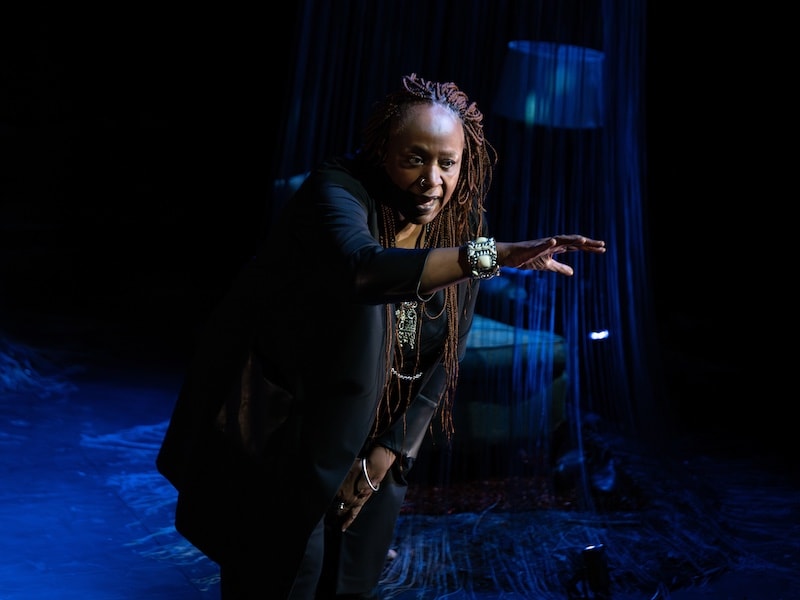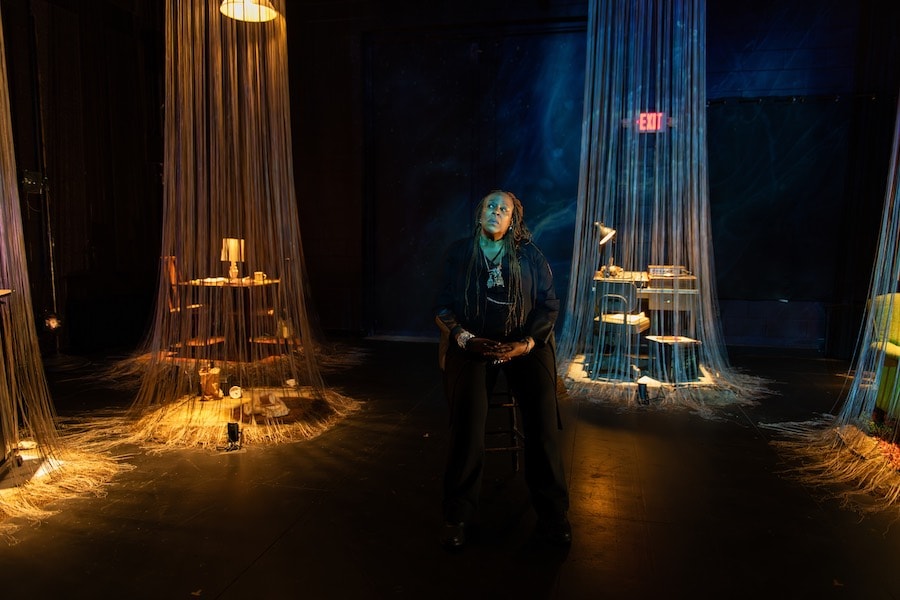One of the great, all-too-familiar ironies of life is that, too often, we don’t appreciate what we have until it’s gone. That’s a cliche, of course, but one that strikes close to the bone and is all the more telling when it comes to the business of life itself. In her one-woman show Spiritus/Virgil’s Dance, a world premiere running in repertory at Shepherd University’s Contemporary American Theater Festival, playwright-performer Dael Orlandersmith wants to make sure we don’t fall victim to that irony or that cliche, enacting lives that have very little “life” in them at all.
“I was always aware of time,” Orlandersmith begins, in what is effectively a 90-minute monologue told by a character named Virgil, who relates their awakening to the meaning and beauty of life in themselves and others. Virgil’s gender is not made clear, nor whether or not there is an intended reference to the Virgil of Dante’s Divine Comedy, although this Virgil, too, must travel through the realms of death in order to experience life. Growing up in working-class Bronx, New York, where lives are hard and dreams broken at inception, Virgil has the gift of “seeing into people,” and they do not like what they find. Most people, Virgil comes to understand, live lives of quiet desperation, spending their days in meaningless jobs and their nights in vain attempts at solace—through drink, drugs, sex, or the soporifics of television. They are the benumbed, soulless commuters of T. S. Eliot’s The Waste Land, more dead than living.

It takes a death to initiate Virgil’s own awakening, although there are glimpses of it in the teenaged Virgil’s fascination with tombstones, epitaphs, and personal biography. When Virgil’s mother dies, the adult Virgil finds that underneath the exhausted, seemingly ordinary homemaker—the person Virgil thought they knew—was a woman who loved French film, stylish shoes, and European fashion. The same is true when Virgil relates the death of their father, not long after. Here is another person with a secret life, richer than what appeared on the surface—or what Virgil had bothered to find out about while their father was alive.
It is through the deaths of their mother and father that Virgil meets a hospice nurse (Debbie) and reconnects with a local mortician (Jimmy), whose insights into their parents’ lives and those of others set Virgil on their own path to meaning and fulfillment. The questions Virgil asks about vocation, calling, and purpose are answered in the decision, taken at age 42—so, near Dante’s famed “middle of life”—to become a mortician themselves. The most affecting parts of Orlandersmith’s performance come in the sections where they describe the process of embalming—here, a deeply moving act of love, compassion, and respect for the dead that involves a kind of relationship. As Virgil prepares bodies for the journey beyond, we enter the tragic, yet deeply human stories of a child rape victim, a dancer who died of an overdose, and a five-month-old baby.
The death of the latter raises age-old questions about justice, meaning, and God—questions that no one, including Virgil, can answer. Perhaps, Virgil recalls the nurse Debbie saying, the baby briefly entered the world to remind others about the importance of love and compassion, and that was enough.
With a simple but powerful message, Orlandersmith commands the audience’s attention. We feel that the artist is telling us her story, because she appears so deeply invested in it. On brief occasions, Orlandersmith reads from the script itself, but otherwise moves between the individual set pieces (beautifully designed by Takeshi Kata and lit by Mary Louise Geiger), which evoke places important to Virgil’s life—the family dining room, the living room with Virgil’s father’s easy chair, the music studio where Virgil worked, the adult Virgil’s apartment. Kata and colleagues surround these small set pieces with multiple thin strands of translucent material—much like strands of translucent beads—which create a magical quality, as if we are seeing things forever stored in Virgil’s memory, never to change. Or perhaps, continuing with the Dante metaphor, these are places lit with “soul,” radiating the life that has taken place in them. Regardless, Spiritus’ set and light design are arresting, as is the atmospheric, dreamlike sound design of Lindsay Jones, which features most prominently in the show’s beginning.

Is Orlandersmith invoking Dante’s Divine Comedy, and are we being invited to a journey through death to life with Spiritus’ Virgil as our guide? It’s hard to say. Most of us will never know what a mortician experiences. But, like Dante in his conclusion to each section of The Comedy, in Spiritus/Virgil’s Dance, Orlandersmith leaves us “to meet God . . . among the stars”—which, in Nicholas Hussong’s effective video design, are projected like a bright carpet across the front of the black box theater.
Like Virgil, we are aware of time, of the preciousness of life—liner notes tell us that “spiritus” is Latin for “breathing”—of the intersection of lives like stars, which are always more radiant when they reflect one another.
Running Time: Approximately 90 minutes, no intermission.
Spiritus/Virgil’s Dance plays through July 29, 2023, presented by the Contemporary American Theater Festival performing in Studio 112, 92 W Campus Drive, Shepherdstown, WV, in repertory with four other CATF plays. See the CATF website (catf.org/2023-schedule) for performance dates and times. Purchase tickets ($70 regular, $60 senior) at catf.org/buy-tickets or through the box office, [email protected] or 681-240-2283.
COVID Safety: There are two mask-required performances (July 13 at 7 pm and
July 29 at 7 pm); otherwise, masks are optional.
Spiritus/Virgil’s Dance by Dael Orlandersmith
Directed by Neel Keeler
A world premiere at the Contemporary American Theater Festival
Cast
Dael Orlandersmith
Production
Scenic Design: Takeshi Kata
Costume Design: Kaye Voyce
Lighting Design: Mary Louise Geiger
Assoc. Lighting Design: K. Rudolph
Original Music & Sound Design: Lindsay Jones
Video Design: Nicholas Hussong
Stage Manager: Deb Acquavella
Assoc. Sound Design: Veronica Lancaster
Casting: Pat McCorkle, CSA, Rebecca Weiss, CSA
Contemporary Companion Dramaturg: Naysan Mojgani




